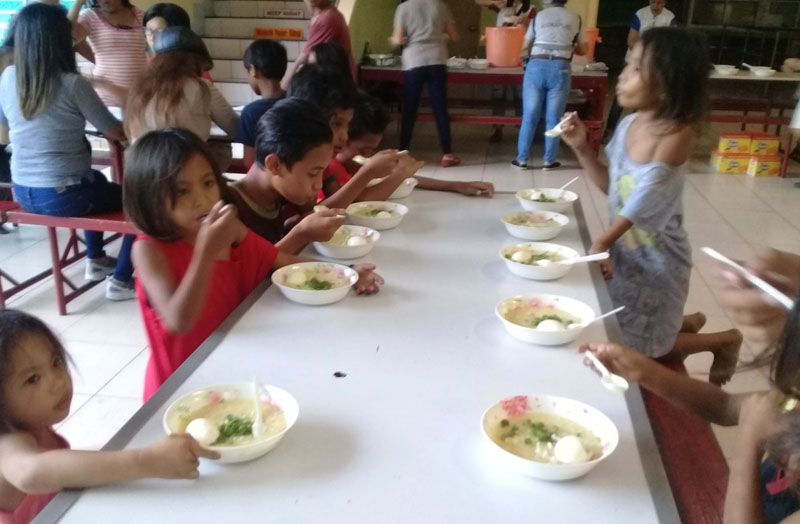Kan-anan ni Niño: a Soup Kitchen program

The families living outside the Basilica are fed with the help of the Hotels and Restaurant Association of Cebu which is pioneered by Café Laguna.

Kan-anan ni Nino Feeding Program
This feeding program is being implemented by the Sto. Nino de Cebu Social Augustinian Social Development Foundation, Inc. (SNAF), which is a partner non-profit organization of the Basilica from the Augustinian Province of Sto. Nino de Cebu-Philippines. To know more about the program here is the overview.
The Project
The “Kan-ananni Niño” Soup Kitchen & Drop-in Center for the Needy is a community service project provided by Santo Nino de Cebu Augustinian Social Development Foundation, Inc. (SNAF) for the homeless families in the vicinity of the Basilica del Sto. Nino. It offers a hot supper meal free-of-charge and bath with washing once a week. The guests will also be engaged in values formation, sports camp, skills trainings, tutorials and other developmental or capacity building activities. It will also offer case management and referral services as needed. To promote self-reliance and care for the environment, the bath and wash will be availed through exchange of plastic scraps.
Under SNAF’s Children and Family program, the project has goals of enhancing opportunities of children and families for their holistic development. The soup kitchen’s guests are envisaged to become possible beneficiaries/partners of SNAF’s planned climate smart shelter and livelihood projects. Those guests who are willing to give up life in the city and live through organic farming.
Project Objectives
The project’s general objective is to achieve a better quality of life for the homeless families, older persons and children within the vicinity of the Basilica del Santo Nino.
Its specific objectives are as follows:
- To nourish the homeless guests of the soup kitchen and drop-in center for their basic need of food by providing a hot and nutritious supper meal, once a week to a target of 100 participants, free of charge.
- To maintain the health of the guests through hygienic practices and care for the environment though a shower and laundry facility, once a week with plastic scrap exchange-deal.
- To build the capacities of this community of people by sharing the love of the Holy Child through values formation, life skills, tutorials and other developmental activities.
- To sustain opportunities of guests through referral services and opportunities for school, skills development, shelter and livelihoods.
Services and Programs
To achieve its objectives, the “Kan-anansa Niño” Soup Kitchen & Drop-in Center for the Needy Homeless Children & Families offers the following services:
1. Hot and Nutritious Meal
Guests of the kitchen will be offered hot and nutritious meal preferably supper for their sustenance. This is free of charge to identified homeless children and families.
2. Shower and Laundry Services
Shower and laundry services will be provided once a week on a scrap exchange-deal. Depending on availability, surplus clothes and hygiene kits will also be given to guests on the same scheme of ex-deal with scrap.
3. Capacity Development Camps
The soup kitchen and drop-in center will also offer capacity enhancement programs to its guests. To be offered are age-appropriate values formation sessions, life skills, tutorials and other developmental activities meant to enhance or even to harness their capabilities.
Project Strategies
Night Walk – one of the strategies in knowing the needs of the target guests of the soup kitchen is to adapt the Night-Walk where we will journey with them at nighttime starting at around 6 to 9 p.m. when most of them occupy their spaces and occupations.
Case Management – the individual needs of the kitchen guests will be taken into consideration when identifying interventions to help them solve their problems in social functioning. The Client Intake Form will be used as a tool for referrals and case management.
Participation – guests will be part of the whole process of development. They will be involved in organizing the meals and other services. Potential leaders will be identified among them to help facilitate the activities.


